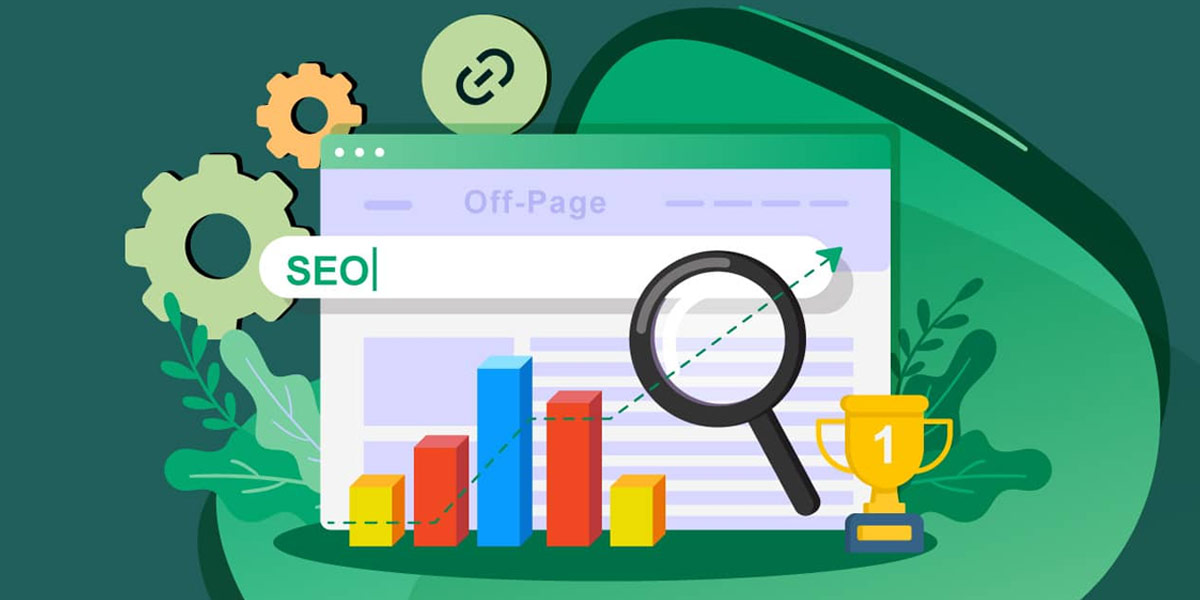Master Off-Page SEO Techniques to Outsmart Your Competitors 2023

Do you ever wonder how your competitors always seem to be one step ahead of you in the search engine rankings? While on-page SEO is important, it’s only half the battle. Off-page SEO can make all the difference in outsmarting your competition and securing those top spots. In this blog post, we’ll explore some master off-page SEO techniques that will take your website to the next level and leave your competitors scrambling to catch up. Get ready to take notes and start implementing these strategies today!
Understanding Off-Page SEO: A Beginner’s Guide
Off-page SEO is a crucial aspect of search engine optimization that focuses on improving your website’s visibility and credibility outside of your website. It encompasses all the activities you can do off your website to improve its ranking in search engine results pages (SERP).
Link building is one of the most important strategies used in off-site SEO, which involves acquiring backlinks from high-authority websites to boost your domain authority and establish trust with search engines.
Another key factor in off-page optimization is social media optimization, where an active social media presence can help increase brand awareness, and engagement, and drive traffic to your site.
By implementing effective off-page optimization techniques like link building and social media optimization, you can enhance your online reputation management, attract more visitors to your site, and ultimately outrank competitors in SERP for relevant keywords.

Master Off-Page SEO Techniques to Outsmart Your Competitors 2023 – A Beginner’s Guide
The Importance of Backlinks in Off-Page SEO
Off-page SEO checklist is all about building your website’s credibility and authority through external links. Backlinks are essential in off-page SEO, as they signal to search engines that other websites find your content valuable. However, not all backlinks are created equal. Quality over quantity is key when it comes to link building.
High-quality backlinks come from reputable sources such as industry influencers or popular websites in your niche. Anchor text also plays a crucial role in the effectiveness of backlinks. It should be relevant to the linked page and include targeted keywords.
There are several techniques for acquiring quality backlinks, including outreach campaigns, broken link building, and guest posting on authoritative sites. It’s important to avoid black hat tactics like buying links or participating in link farms, which can harm your ranking instead of boosting it.
A solid understanding of off-page SEO factors combined with effective link-building strategies will help you outrank competitors and increase organic traffic to your site.

Master Off-Page SEO Techniques to Outsmart Your Competitors 2023 – The Importance of Backlinks
How to Build High-Quality Backlinks for Your Website
Building high-quality backlinks are one of the most important aspects of off-page SEO. Here are some effective ways to build backlinks for your website:
- Use broken link building: Find broken links on relevant websites in your industry and reach out to the website owner, offering to replace the broken link with a link to your own content.
- Guest posting on authoritative sites: Write quality guest posts on high-authority blogs related to your niche and include a relevant backlink in the author bio or within the article body itself.
- Participate in forums and discussion boards: Join online forums related to your niche and engage with other members by answering questions, sharing insights, leaving comments, etc., while including a link back to your website where appropriate.
- Utilize social media platforms: Share valuable content that links back to your site on various social media channels like Facebook, Twitter, LinkedIn and Instagram.
Remember that quantity does not matter as much as quality when it comes to building backlinks for off-page SEO success. Focus on creating natural-looking links from authoritative sources that add value for both you and the linking site’s audience.

Master Off-Page SEO Techniques to Outsmart Your Competitors 2023 – Build High-Quality Backlinks
Social Media and Off-Page SEO: Tips and Tricks
Leveraging Social Media for Off-Page SEO: Best Practices to Follow
Social media is a powerful tool for off-page SEO. By leveraging social media platforms, you can increase your website’s visibility and drive traffic to your site. To make the most of social media for off-page SEO, it’s important to follow some best practices. First, choose the right platforms that are relevant to your business and audience. Second, create engaging content that encourages likes, shares, and comments. Third, use relevant hashtags to increase visibility and reach. Fourth, engage with your followers by responding to comments and messages promptly. Finally, monitor your social media metrics to track your progress and adjust your strategy accordingly.
Build a Strong Social Media Presence with these Off-Page SEO Techniques
To boost your off-page SEO, it’s essential to have a strong social media presence. Social signals are becoming increasingly important for search engine rankings. To start, create profiles on all major social media platforms and post regularly with relevant keywords and hashtags. Engage with your followers by responding to comments and messages promptly. Encourage social sharing of your content by adding social sharing buttons to your website. Collaborate with influencers in your niche to increase your reach and credibility. Lastly, track your social media metrics regularly to see what’s working and what’s not, and adjust your strategy accordingly. With these social signals and social sharing techniques, you can improve your off-page SEO significantly.
How to Use Social Media Platforms to Boost Your Website’s Rankings
Social media platforms are crucial for improving your website’s off-page SEO. By creating a strong social media presence, you can improve brand visibility and increase the chances of gaining high-quality backlinks. Engagement is key when it comes to social media as it helps build trust with your audience, leading to better engagement rates and more shares of your content. Ensure that all your social profiles link back to your site and post regularly on each platform using relevant keywords in captions and hashtags. This will help establish yourself as an authority in your niche while also improving search engine rankings through increased traffic from social signals!
Tips and Tricks for Incorporating Social Signals into Your Off-Page SEO Strategy
To incorporate social signals into your off-page SEO strategy, make sure to create high-quality content that is shareable on social media. Include social sharing buttons on your website and encourage visitors to engage with your brand through social channels. Additionally, consider collaborating with influencers in your industry who can help increase the visibility of your brand on social media platforms. Engage with users by responding to comments and messages promptly and using relevant hashtags when posting content. Consistent and active engagement on popular platforms like Facebook, Instagram, Twitter etc., can greatly improve the off-page SEO of your business website.
Guest Blogging: A Powerful Off-Page SEO Strategy
Guest Blogging is a powerful off-page SEO strategy that can help you build high-quality backlinks and increase your website’s visibility. To get started, look for websites in your niche that accept guest posts. Make sure to read their guidelines carefully and pitch a topic that is relevant and valuable to their audience. When writing your guest post, include relevant keywords and link back to your website in a natural way. This will not only help you get more traffic but also improve your search engine rankings. Remember, the key to successful guest blogging is to provide value to the readers and establish yourself as an authority in your niche. So, take the time to research and write high-quality content that will benefit both the host website and your own website.

Master Off-Page SEO Techniques to Outsmart Your Competitors 2023 – Guest Blogging
Local SEO: How to Optimize Your Business for Local Searches
Claim and Optimize Your Google My Business Listing
One of the most critical off-page SEO strategies for businesses that cater to local customers is claiming and optimizing their Google My Business (GMB) listing. GMB listings provide a wealth of information about your business, including your name, address, phone number, website URL, hours of operation, and customer reviews. Ensure that all the details in your GMB listing are accurate and up-to-date as it directly impacts the visibility of your business on search engine result pages (SERPs), especially for location-based searches. To further enhance the optimization of your GMB profile, add photos and videos highlighting products or services offered by your business.
Building Local Citations for Increased Visibility
Local citations are mentions of your business’s name, address, and phone number (NAP) on other websites. These citations help search engines understand the relevance and credibility of your business in a specific location. Building local citations on high-authority websites such as Yelp, Google My Business, and Yellow Pages can improve your website’s visibility in local search results. It is important to ensure that your NAP information is consistent across all citations to avoid confusion for both search engines and potential customers. Regularly updating and managing your local citations can also help maintain the accuracy of your business information online.
Acquire Backlinks from Local Websites and Directories
Acquire local backlinks from reputable business directories in your area to improve your website’s visibility in local search results. Ensure that the directories you choose are relevant to your business niche and have high domain authority. Additionally, building relationships with other local businesses and getting them to link back to your website can also boost your local SEO efforts. Joining online communities or forums specific to your industry can help you connect with potential linking partners. By acquiring high-quality backlinks from authoritative sources in your locality, you increase the chances of ranking higher on search engine results pages for local keywords related to your business.
Localized Content Creation Strategies for Improved Rankings
To improve your local SEO rankings, it’s crucial to create content that is relevant to your target audience in the specific location you are targeting. Incorporate local keywords into your content, such as the name of the city or region you are targeting. Use geo-specific language to describe your products or services and how they relate to the local area. Additionally, consider creating location-specific landing pages for each of your business locations, with unique content that speaks directly to the needs and interests of that particular community. By creating localized content, you can improve your visibility in local search results and attract more targeted traffic to your website.

Master Off-Page SEO Techniques to Outsmart Your Competitors 2023 – Local SEO
The Role of Content Marketing in Off-Page SEO
Content marketing plays a crucial role in off-page SEO. By creating high-quality, informative, and engaging content that attracts backlinks from other websites, you can improve your website’s search engine ranking. The key to successful content marketing is to create valuable and relevant content that resonates with your target audience.
Start by conducting keyword research to identify topics relevant to your business niche. Research the latest trends in your industry and create blog posts, infographics or videos addressing those subjects. Ensure that every piece of content offers unique insights, solutions or viewpoints not found elsewhere on the web.
Make sure each piece of content has valuable information for readers so they are more likely to link back to it when citing their own work. Also, share well-crafted pieces through social media channels and encourage followers to engage with them which could lead to better visibility on platforms like Twitter or LinkedIn.
Finally, monitor traffic fluctuations as some articles may be particularly successful than others then strategically adjust future content accordingly based upon performance metrics obtained from success measurement tools such as Google Analytics“.

Master Off-Page SEO Techniques to Outsmart Your Competitors 2023 – Content Marketing
Monitoring and Measuring Your Off-Page SEO Success
Off-page SEO success can be measured by tracking the increase in website traffic, higher search engine rankings, and an overall improvement in brand visibility. There are several tools available to track these metrics such as Google Analytics and SEMrush. You should regularly monitor your backlink profile using a tool like Ahrefs to make sure that they are coming from high-quality sources.
In addition to monitoring, you need to maintain consistent efforts towards off-page SEO activities. Keep building backlinks through guest blogging, social media marketing, and other outreach strategies. Regularly post engaging content on your website and share it on various platforms so that people can link back to it.
It is also important to keep an eye on what your competitors are doing for their off-page optimization strategies. Analyze their marketing tactics with tools like SimilarWeb or SpyFu and see if you can replicate or adapt them for your own website.
Overall, measuring and monitoring off-page SEO performance will help you stay ahead of the competition by identifying areas where improvements can be made while continuing successful strategies.
In conclusion, mastering off-page SEO techniques is essential for any business that wants to remain competitive in the online world. By understanding the basics of off-page SEO and implementing strategies such as building high-quality backlinks, leveraging social media platforms, guest blogging, optimizing for local searches, and content marketing, you can drive more traffic to your website and improve your search engine rankings. It’s also important to monitor and measure your progress regularly so you can fine-tune your efforts and stay ahead of the competition. With these tips in mind, you’ll be well on your way to boosting your online presence through effective off-page SEO tactics.

